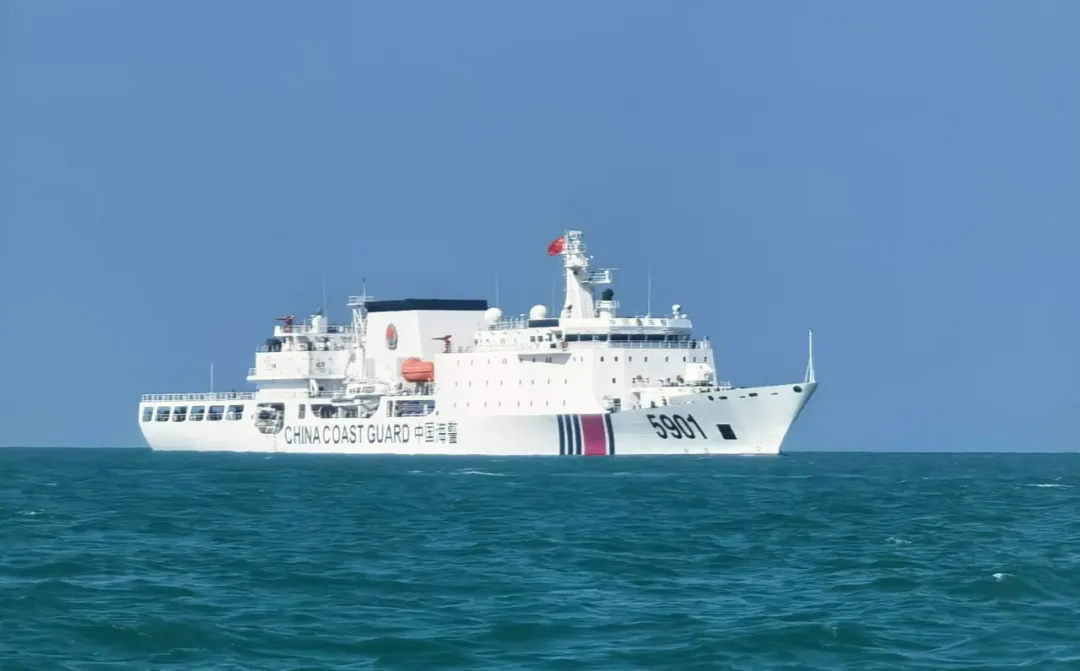
The photo shows China Coast Guard vessel 5901. (File photo)
By Yang Xiao
At the beginning of 2025, the 12,000-ton law enforcement vessel 5901 of the Chinese Coast Guard (CCG) conducted normal patrols and law enforcement in the waters under China's jurisdiction. However, it became the target of a concentrated smear campaign by a few Filipino politicians, official agencies, media affiliates, and hostile forces behind the scenes. These groups have labeled the CCG vessel a "monster ship" in a deliberate effort to stir up negative publicity.
Attaching derogatory labels to CCG's legitimate law enforcement vessel is one of the "name and shame" strategies employed by a few Philippine politicians and affiliated media, instigated by the behind-the-scenes forces. This tactic is commonly used in their numerous activities around the world to incite confrontation, promote conflict and undermine peace.
According to some Filipino politicians, the CCG vessel 5901 is dubbed a "monster" due to its displacement of approximately 12,000 tons, which is four to five times greater than that of the largest law enforcement vessel in the Philippines. This rhetoric, tinged with envy, fear, and resentment, vividly illustrates the psychological breakdown experienced by the Philippine side after facing legitimate CCG law enforcement against its illegal maritime activities.
CCG vessel 5901 is well-designed, professionally equipped, and operates under strict regulations and professionalism. The Philippine side's deliberate defamation aims to cast itself as a "weak and innocent" victim to garner sympathy from the international community. However, the ongoing escalation of maritime disputes between China and the Philippines in recent years has been consistently provoked by the Philippines' infringement of China's maritime rights and interests.
Since the Marcos administration took office in 2022, it has aggressively advanced the so-called "West Philippine Sea" agenda, creating continuous disturbances at Ren'ai Jiao, Huangyan Dao, Tiexian Jiao, and Xianbin Jiao in the South China Sea. On November 8, 2024, the Philippines passed the Maritime Zones Act and the Archipelagic Sea Lanes Act, which severely infringed upon China's territorial sovereignty and maritime rights in the South China Sea.
In response, China released the baseline coordinates of the territorial sea surrounding Huangyan Dao in accordance with international law and norms to strengthen maritime management. The patrol and law enforcement activities conducted by CCG in the relevant waters are legitimate actions to safeguard national territorial sovereignty and maritime rights, as well as to ensure maritime security and the ecological environment. As stated by a spokesperson from China's Ministry of Foreign Affairs, these actions are "beyond reproach."
It can be seen that the real "monster" is not actually a Chinese vessel, but ulterior motives in the hearts of a few Filipino politicians and the forces behind them. It is the sinister ambition of those who attempt to stir up the situation, manipulate public opinion, and undermine peace.
China's law enforcement vessels will continue to carry out patrols and law enforcement activities in waters under China's jurisdiction as planned. Such operations are not only the protection of regional peace and stability but also can help the Filipino people get rid of the manipulation of a few unscrupulous politicians. Such operations can encourage the Philippine authorities to abandon provocative and untrustworthy behavior and return to the path of dialogue, consultation, and negotiation in resolving the South China Sea disputes. This would enable the Philippines to work together with China and other countries surrounding the South China Sea to maintain peace, tranquility and prosperity in the region.
(The author is an expert on maritime issues at the China Institutes of Contemporary International Relations.)
Editor's note: Originally published on VSCS, this article is translated from Chinese into English and edited by the China Military Online. The information and opinions in this article do not necessarily reflect the views of eng.chinamil.com.cn.













